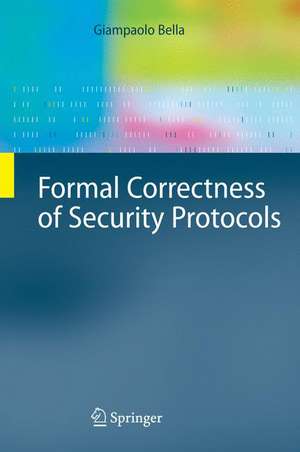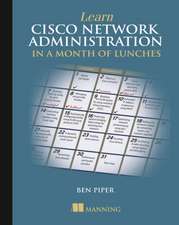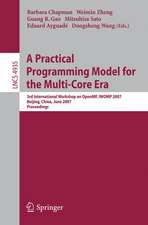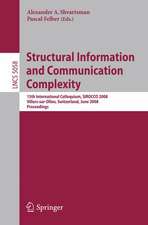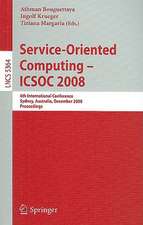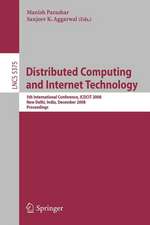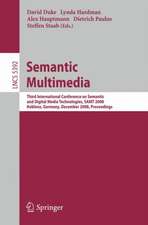Formal Correctness of Security Protocols: Information Security and Cryptography
Autor Giampaolo Bellaen Limba Engleză Hardback – 5 mar 2007
The author investigates proofs of correctness of realistic security protocols in a formal, intuitive setting. The protocols examined include Kerberos versions, smartcard protocols, non-repudiation protocols, and certified email protocols. The method of analysis, the Inductive Method in the theorem prover Isabelle, turns out to be both powerful and flexible. This research advances significant extensions to the method of analysis, while the findings on the protocols analysed are novel and illuminating.
This book will benefit researchers and graduate students in the fields of formal methods, information security, inductive methods, and networking.
| Toate formatele și edițiile | Preț | Express |
|---|---|---|
| Paperback (1) | 332.39 lei 6-8 săpt. | |
| Springer Berlin, Heidelberg – 30 noi 2010 | 332.39 lei 6-8 săpt. | |
| Hardback (1) | 337.20 lei 6-8 săpt. | |
| Springer Berlin, Heidelberg – 5 mar 2007 | 337.20 lei 6-8 săpt. |
Din seria Information Security and Cryptography
- 20%
 Preț: 352.02 lei
Preț: 352.02 lei - 20%
 Preț: 770.31 lei
Preț: 770.31 lei - 20%
 Preț: 303.85 lei
Preț: 303.85 lei - 20%
 Preț: 1452.94 lei
Preț: 1452.94 lei - 20%
 Preț: 988.49 lei
Preț: 988.49 lei - 20%
 Preț: 327.10 lei
Preț: 327.10 lei - 20%
 Preț: 636.41 lei
Preț: 636.41 lei - 20%
 Preț: 453.21 lei
Preț: 453.21 lei - 20%
 Preț: 607.34 lei
Preț: 607.34 lei - 20%
 Preț: 331.40 lei
Preț: 331.40 lei - 20%
 Preț: 406.32 lei
Preț: 406.32 lei - 20%
 Preț: 346.56 lei
Preț: 346.56 lei - 18%
 Preț: 950.52 lei
Preț: 950.52 lei - 24%
 Preț: 795.27 lei
Preț: 795.27 lei - 20%
 Preț: 595.08 lei
Preț: 595.08 lei - 20%
 Preț: 487.74 lei
Preț: 487.74 lei -
 Preț: 450.28 lei
Preț: 450.28 lei - 20%
 Preț: 877.79 lei
Preț: 877.79 lei - 20%
 Preț: 332.39 lei
Preț: 332.39 lei - 20%
 Preț: 418.59 lei
Preț: 418.59 lei - 20%
 Preț: 649.28 lei
Preț: 649.28 lei - 20%
 Preț: 552.73 lei
Preț: 552.73 lei - 20%
 Preț: 577.41 lei
Preț: 577.41 lei - 20%
 Preț: 653.38 lei
Preț: 653.38 lei - 20%
 Preț: 670.26 lei
Preț: 670.26 lei - 20%
 Preț: 334.53 lei
Preț: 334.53 lei - 20%
 Preț: 414.72 lei
Preț: 414.72 lei - 20%
 Preț: 640.69 lei
Preț: 640.69 lei
Preț: 337.20 lei
Preț vechi: 421.49 lei
-20% Nou
Puncte Express: 506
Preț estimativ în valută:
64.53€ • 68.100$ • 53.80£
64.53€ • 68.100$ • 53.80£
Carte tipărită la comandă
Livrare economică 18 aprilie-02 mai
Preluare comenzi: 021 569.72.76
Specificații
ISBN-13: 9783540681342
ISBN-10: 3540681345
Pagini: 296
Ilustrații: XX, 274 p. 64 illus.
Dimensiuni: 155 x 235 x 23 mm
Greutate: 0.55 kg
Ediția:2007
Editura: Springer Berlin, Heidelberg
Colecția Springer
Seria Information Security and Cryptography
Locul publicării:Berlin, Heidelberg, Germany
ISBN-10: 3540681345
Pagini: 296
Ilustrații: XX, 274 p. 64 illus.
Dimensiuni: 155 x 235 x 23 mm
Greutate: 0.55 kg
Ediția:2007
Editura: Springer Berlin, Heidelberg
Colecția Springer
Seria Information Security and Cryptography
Locul publicării:Berlin, Heidelberg, Germany
Public țintă
ResearchCuprins
The Analysis of Security Protocols.- The Inductive Method.- Verifying the Protocol Goals.- The Principle of Goal Availability.- Modelling Timestamping and Verifying a Classical Protocol.- Verifying a Deployed Protocol.- Modelling Agents’ Knowledge of Messages.- Verifying Another Deployed Protocol.- Modelling Smartcards.- Verifying a Smartcard Protocol.- Modelling Accountability.- Verifying Two Accountability Protocols.- Conclusions.
Recenzii
From the reviews:
"This book is about the Inductive Method technique for proving the correctness of security protocols. It is very well suited for the reader who wants to know the state of the art of proving protocol security using the Inductive Method and the interactive theorem prover Isabelle. … The book could be used as a textbook on the advanced topics in protocol security. It is highly recommended to the newcomer in the field who wants technical information, and to the researcher in the area … ." (Yongge Wang, Mathematical Reviews, Issue 2008 f)
"In summary, my opinion is that this is a great book in the field of computer security, for the practitioner and theoretician alike, since it provides an ideal mixture of theoretical results and applications of them in real protocol analysis scenarios. The book combines, in an ideal way, the features of a rigorous book and a “cookbook”. ... In conclusion, I would strongly recommend this book to people involved in formally proving properties about security protocols as well as students making their first steps in studying such protocols." (Yannis C. Stamatiou, Univ. of Ioannina, Greece, ACM SIGACT News Book Review 41(1) 2010)
“The book addresses the software development theorists interested in both modelling and automatic verification of security protocols. … The present text … includes a valuable contribution devoted to apply the inductive method for verifying properties of real-world communication protocols. … The interested computer scientist … find here valuable hints for future important developments in specifying and verifying secure network communication protocols.” (Tudor Bălănescu, Zentralblatt MATH, Vol. 1176, 2010)
"This book is about the Inductive Method technique for proving the correctness of security protocols. It is very well suited for the reader who wants to know the state of the art of proving protocol security using the Inductive Method and the interactive theorem prover Isabelle. … The book could be used as a textbook on the advanced topics in protocol security. It is highly recommended to the newcomer in the field who wants technical information, and to the researcher in the area … ." (Yongge Wang, Mathematical Reviews, Issue 2008 f)
"In summary, my opinion is that this is a great book in the field of computer security, for the practitioner and theoretician alike, since it provides an ideal mixture of theoretical results and applications of them in real protocol analysis scenarios. The book combines, in an ideal way, the features of a rigorous book and a “cookbook”. ... In conclusion, I would strongly recommend this book to people involved in formally proving properties about security protocols as well as students making their first steps in studying such protocols." (Yannis C. Stamatiou, Univ. of Ioannina, Greece, ACM SIGACT News Book Review 41(1) 2010)
“The book addresses the software development theorists interested in both modelling and automatic verification of security protocols. … The present text … includes a valuable contribution devoted to apply the inductive method for verifying properties of real-world communication protocols. … The interested computer scientist … find here valuable hints for future important developments in specifying and verifying secure network communication protocols.” (Tudor Bălănescu, Zentralblatt MATH, Vol. 1176, 2010)
Textul de pe ultima copertă
Computer network security is critical to fraud prevention and accountability. Network participants are required to observe predefined steps called security protocols, whose proof of correctness is evidence that each protocol step preserves some desired properties.
The author investigates proofs of correctness of realistic security protocols in a formal, intuitive setting. The protocols examined include Kerberos versions, smartcard protocols, non-repudiation protocols, and certified email protocols. The method of analysis, the Inductive Method in the theorem prover Isabelle, turns out to be both powerful and flexible. This research advances significant extensions to the method of analysis, while the findings on the protocols analysed are novel and illuminating.
This book will benefit researchers and graduate students in the fields of formal methods, information security, inductive methods, and networking.
The author investigates proofs of correctness of realistic security protocols in a formal, intuitive setting. The protocols examined include Kerberos versions, smartcard protocols, non-repudiation protocols, and certified email protocols. The method of analysis, the Inductive Method in the theorem prover Isabelle, turns out to be both powerful and flexible. This research advances significant extensions to the method of analysis, while the findings on the protocols analysed are novel and illuminating.
This book will benefit researchers and graduate students in the fields of formal methods, information security, inductive methods, and networking.
Caracteristici
First title to offer a full treatment of formal correctness of security protocols Includes supplementary material: sn.pub/extras
